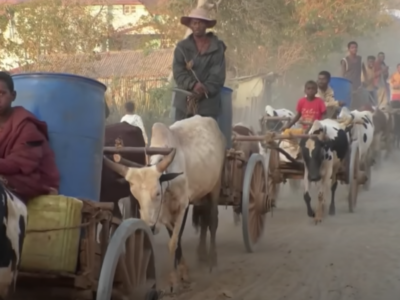
A woman at a political rally in Madagascar in 2015. Image from Flickr. CC BY-SA 2.0 license
See this special coverage in its original French here.
Located in the Indian Ocean in the southeast of the continent, the Republic of Madagascar is the largest island in Africa, with an area of 587,000 kilometers. The island is separated from the rest of the continent by the Mozambique Channel (1,700 km long and 419 km wide). Its population numbers more than 29 million inhabitants spread across six provinces: Antananarivo (center of the country), Antsiranana (north), Fianarantsoa (south-east), Mahajanga (north-west), Toamasina (center- northeast), and Toliara (southwest).
The island is highly vulnerable to the effects of climate change. In 2017, the Global Climate Risk Index ranked Madagascar as the seventh country most affected by climate change. Strong and violent storms and cyclones regularly cause serious flooding: in 2022, the island was shaken by four cyclones in one month.
Conquered in 1883 following a French invasion and then colonized in 1895, Madagascar freed itself from the French empire on June 26, 1960. However, its colonial past continues to influence the island's political dynamics, and ties with France remain strong.
In 2009, Marc Ravalomanana, president of Madagascar, was ousted following a popular uprising led by Andry Rajoelina, elected mayor of Antananarivo, the country's capital, in 2007. With the blessing of France, Rajoelina assumed the role of president during the transition from 2009 to 2013, the year when new elections were organized. Forced to abandon the political race, he left for France, where he discreetly obtained French citizenship with his entire family before returning to run in the 2018 presidential elections, which he won. This French citizenship, revealed to the general public at the end of 2022, has aroused the anger of his opponents, who are demanding he step down from power. The same argument has been used to prevent him from running again in the presidential elections of November 2023. Indeed, the opposition sees his dual citizenship as a betrayal of the highest order because dual citizenship is outlawed in Article 46 of the Malagasy Constitution.
In Madagascar, around 80 percent of the population earns their livelihoods via agriculture. Rice is the dominant crop. Even though the country has raw materials such as gold and sapphire and mining resources such as cobalt or oil, these resources are exploited illicitly. Despite the measures put in place by the Malagasy authorities to clean up mining governance, corruption is undermining the sector, and natural resources are subject to illegal exploitation by smuggling networks.
The average monthly income in the country remains low at EUR 40 euros (USD 42.05), and the national income per capita is USD 1,792. This places Madagascar among the poorest countries in the world.
In addition, the country is plagued by corruption. In 2022, according to Transparency International's Corruption Perceptions Index, Madagascar occupies 142nd place out of the 180 indexed countries.
As the country is having two rounds of elections on November 16 and December 20, Global Voices offers special coverage of major issues: politics, economics, environmental issues, music, and literature.
Stories about Madagascar: A destabilized society
In Madagascar, Andry Rajoelina's dual nationality courts controversy on eve of Presidential Election
Madagascar controversy: according to the law, having another nationality voids Madagascar nationality, a prerequisite for election candidates. Yet candidate Andry Rajoelina owns a French passport.
Malagasy political crisis viewed through the lens of photographer Rijasolo
In the lead up to Madagascar’s highly contested presidential election, Global Voices interviewed Malagasy photographer, Rijasolo, who has been covering the latest political events using striking images.
Madagascar: Fatal incident overshadows Indian Ocean Island Games’ opening ceremony
As the incumbent president seeks reelection in November 2023, a fatal stampede has overshadowed the opening ceremony of Madagascar's Indian Ocean Island Games.
Madagascar to host the 2023 Indian Ocean Island Games
However, Malagasy national pride appears to have been overshadowed. The government announced that the games' opening and closing ceremonies would be led by Chinese choreographers.
Malagasy people remain resilient amid the soaring cost of basic commodities
Since the beginning of the year, there has been a steep rise in the cost of basic goods in Madagascar. The government responded by banning all public protests.




